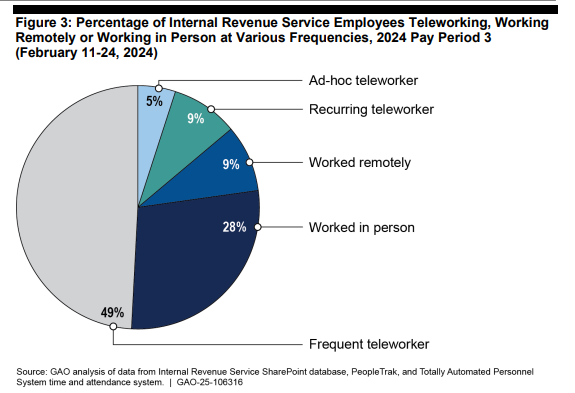DOGE leaders plan telework rollback, as agencies say it improves retention
The Government Accountability Office found increased telework helped some agencies recruit and retain employees — but pay and workload played a bigger role.
Agency supervisors are telling a government watchdog that flexible work agreements help them recruit and retain frontline federal employees who provide benefits and services to the public.
President-elect Donald Trump’s plans for a new Department of Government Efficiency, however, include rolling back telework for the federal workforce, according to the two officials tapped to run the organization.
Trump named businessman Elon Musk and former Republican presidential candidate Vivek Ramaswamy to run DOGE as an entity outside the federal government entity that will advise the Office of Management and Budget on how to cut trillions of dollars in federal spending.
Musk and Ramaswamy wrote in a Wall Street Journal op-ed this week that they plan to require federal employees to return to the office five days a week.
“Requiring federal employees to come to the office five days a week would result in a wave of voluntary terminations that we welcome: If federal employees don’t want to show up, American taxpayers shouldn’t pay them for the Covid-era privilege of staying home,” Musk and Ramaswamy said.
Musk and Ramaswamy’s return-to-office plans fall in line with what federal employees expected following Trump’s reelection. More than 66% of the more than 1,000 federal employees who took Federal News Network’s post-election pulse survey said they expected the incoming administration would reduce telework and remote work.
The Government Accountability Office, in a report released Friday, said increased telework helped some agencies recruit and retain employees — although pay and workload played a bigger role in hiring.
The agencies GAO reviewed — the IRS, the Farm Service Agency, the Veterans Benefits Administration and U.S. Citizenship and Immigration Services — generally saw higher customer service metrics in recent years, when their employees spent most of their time teleworking.
VBA, however, was the only agency among the group that evaluated telework’s role in employee performance, and determined it has a positive impact.
Officials at the other agencies said staffing and funding had a clearer impact on delivering services to the public — as well as competing priorities and Congress passing new laws affecting their workload.
Everett Kelley, national president of the American Federation of Government Employees, said Friday in a C-SPAN interview that federal employees working from home in recent years have been more productive.
“The data is really on the side of those few that are able to work remotely. The data says that more work is being done,” Kelly said.
Recent data shows that telework accounts for a small fraction of total hours worked by federal employees.
An Office of Management and Budget report in August found federal employees spent nearly 80% of their total work hours in the office. More than half of federal employees fully worked in person due to the nature of their jobs, and even a majority of teleworking workers still spend a majority of their work hours in the office.
The Biden administration currently expects teleworking federal employees to spend about 50% of their work hours in the office, although implementation varies by agency.
“It varies between agencies, and whatever that negotiated agreement is, we just expect to adhere to that,” Kelly said.
GAO’s report found that agencies, in general, kept track of track of how many of their employees teleworked, and how many days they typically worked at home.
The Veterans Benefits Administration told GAO that telework is helping the agency meet its mission, and didn’t plan on making further changes to its telework policies.
VBA processing times for veterans’ education claims improved from fiscal 2019 through 2023, when telework use increased. VBA officials said additional flexibilities to hire staff and increased automation also improved productivity.
The agency also found that VBA employee engagement and retention coincided with increased use of telework.
VBA employees teleworked for about 66% of the agency’s total work hours by the end of 2023.
Under Secretary for Benefits Joshua Jacobs told reporters in July that VBA employees in the National Capital Region are required to work in the office five days per two-week pay period.
VBA employees in regional offices outside the D.C. region, however, have been given “maximum telework flexibility,” and are required to come into the office at least two days each pay period. Jacobs said there are some exceptions to this policy for certain types of jobs that require more in-person interaction.
“The [VA] Secretary has been very clear that the VBA team has proven over the past few years that delivering benefits in this environment has enabled us, we’ve delivered increased benefits to veterans. And so long as we continue to do so, we’ll be able to maintain this workplace flexibility,” Jacobs said.
Since May, the IRS has required executives, managers and non-bargaining unit employees with telework agreements to work in the office at least 50% of work hours each month.
This policy, however, does not apply to employees in these positions outside the National Capital Region.
As of February 2024, nearly half of IRS employees were frequent teleworkers — meaning they were approved to work outside the office for more than 80 hours each month. Almost 30% of IRS employees worked fully in-person, and 9% worked remotely. The rest of its workforce teleworked on a recurring or ad-hoc basis.

IRS officials said that telework helped the agency recruit customer service representatives by expanding the talent pool to people who lived further away from agency offices.
IRS customer service representatives who spoke to GAO said they could telework at the “maximum allowable frequency,” which is eight days per pay period. Employees said they can receive calls and answer taxpayer questions regardless of location.
IRS field office supervisors told GAO customer service reps in Baltimore needed to telework at least some days a week, but the agency didn’t have enough office space to accommodate all of them at the same time.
Customer service reps in several locations told GAO that telework helped them avoid commuting expenses, especially employees working at lower salary grades.
IRS officials in Denver told GAO that “without telework, very few people would apply to their location, as a recent increase in the state’s minimum wage paid more per hour than entry-level IRS positions in Denver.”
IRS supervisors said a requirement for new customer service representatives to take 12 weeks of in-person training led to many new hires quitting. At one location, a supervisor said about 30% of new hires quit during their in-person training.
The IRS answered more phone calls from taxpayers and drove down wait times in 2022 and 2023 — both years when IRS employees teleworked a majority of the time.
IRS officials, however, told GAO that the Inflation Reduction Act, which gave the agency billions of dollars to spend on hiring and IT upgrades, made a bigger difference in customer service scores.
Copyright © 2025 Federal News Network. All rights reserved. This website is not intended for users located within the European Economic Area.
Jory Heckman is a reporter at Federal News Network covering U.S. Postal Service, IRS, big data and technology issues.
Follow @jheckmanWFED






